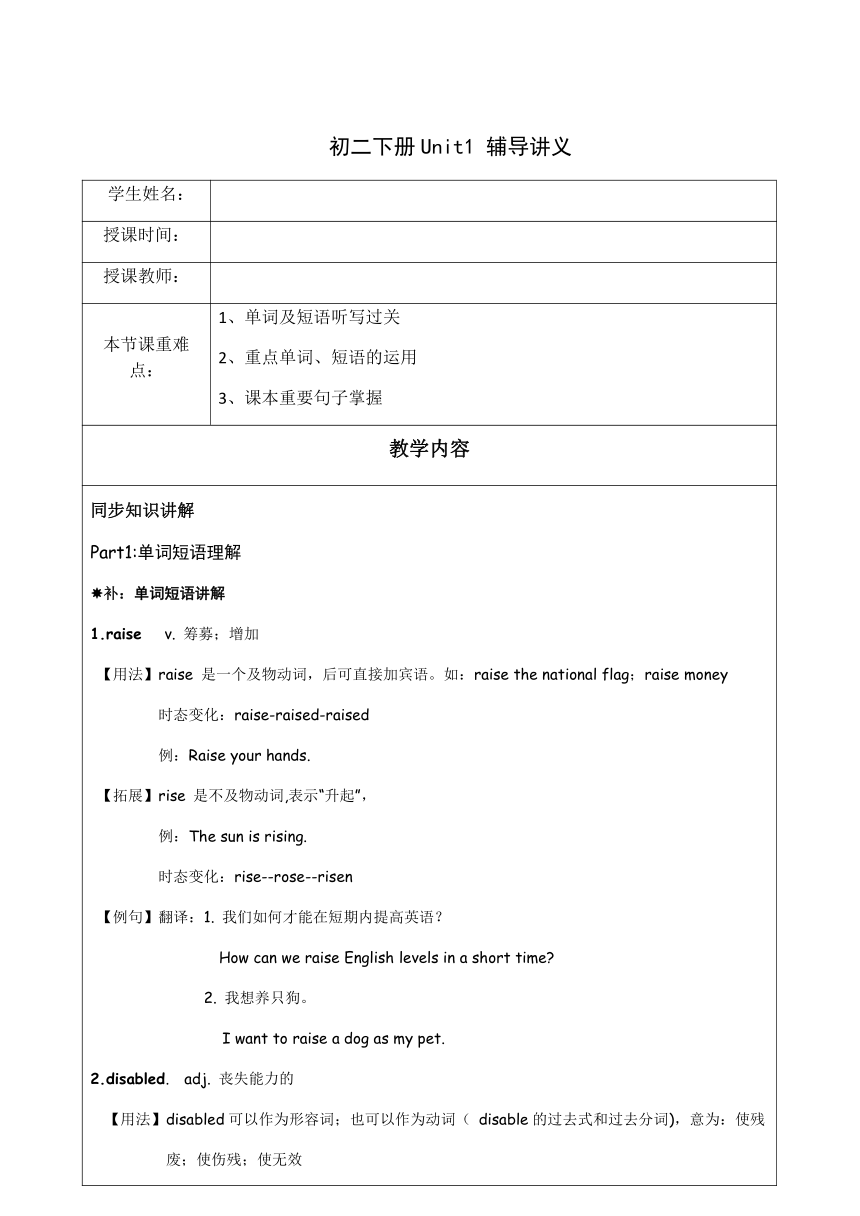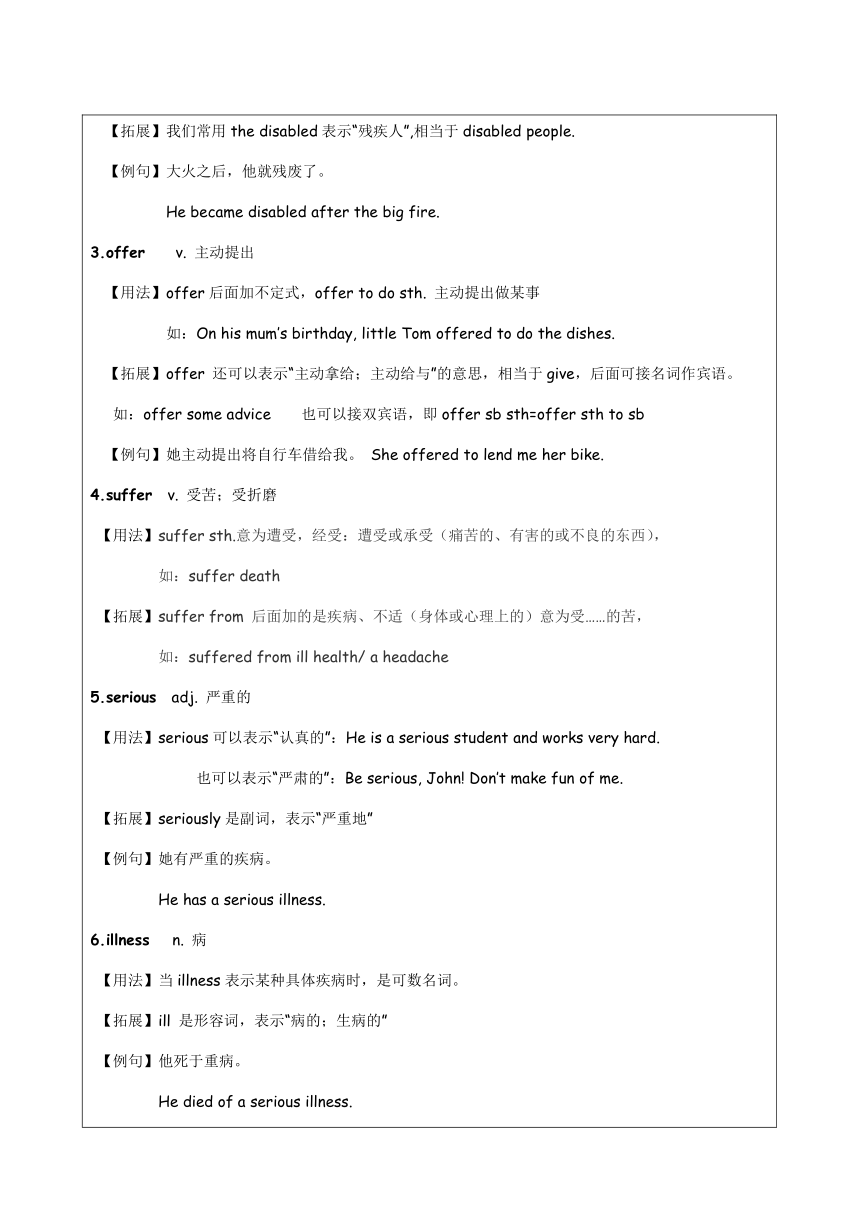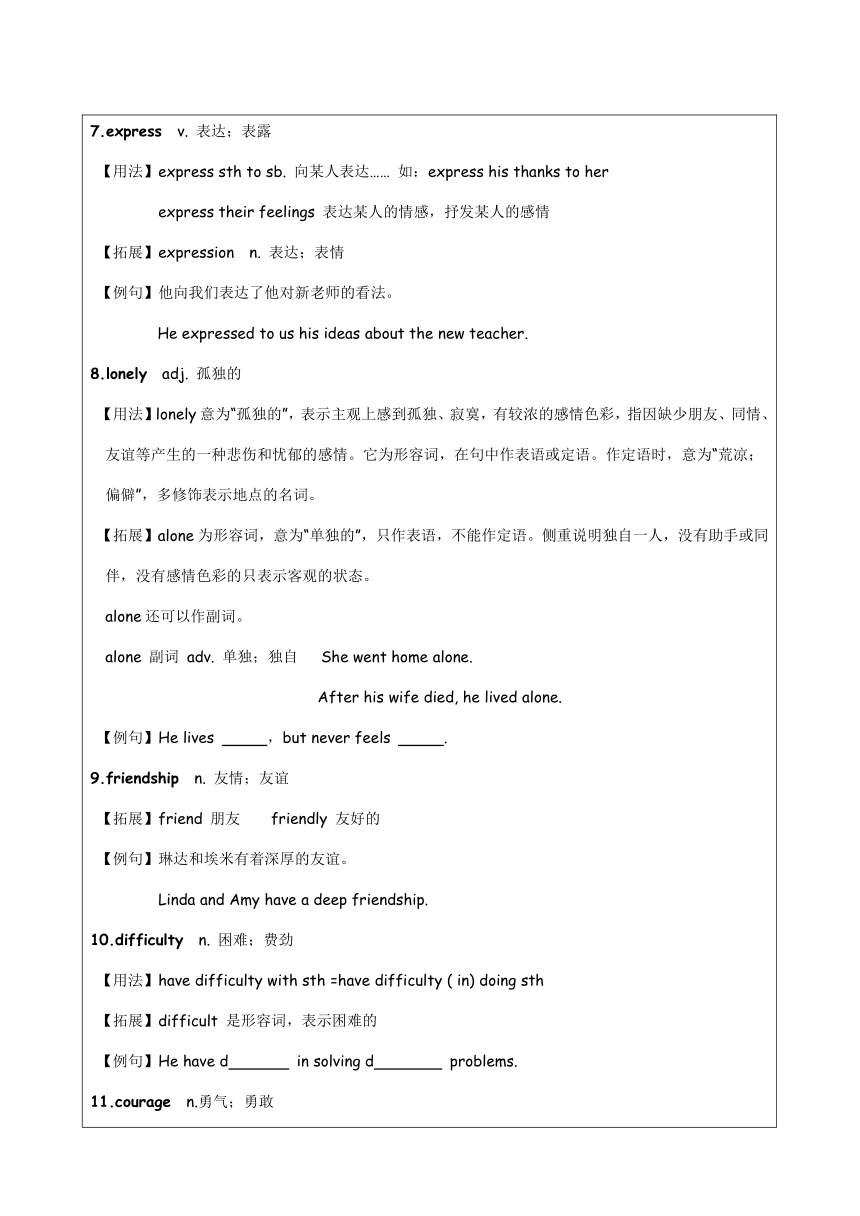2020年牛津深圳版英语八年级下册Module 1 Social communication Unit 1 Helping those in need 辅导讲义
文档属性
| 名称 | 2020年牛津深圳版英语八年级下册Module 1 Social communication Unit 1 Helping those in need 辅导讲义 |

|
|
| 格式 | zip | ||
| 文件大小 | 73.0KB | ||
| 资源类型 | 教案 | ||
| 版本资源 | 牛津深圳版 | ||
| 科目 | 英语 | ||
| 更新时间 | 2020-05-30 13:03:40 | ||
图片预览





文档简介
学生姓名:
授课时间:
授课教师:
本节课重难点:
单词及短语听写过关重点单词、短语的运用课本重要句子掌握
教学内容
同步知识讲解Part1:单词短语理解补:单词短语讲解1.raise
v.
筹募;增加
【用法】raise
是一个及物动词,后可直接加宾语。如:raise
the
national
flag;raise
money
时态变化:raise-raised-raised
例:Raise
your
hands.
【拓展】rise
是不及物动词,表示“升起”,
例:The
sun
is
rising.
时态变化:rise--rose--risen
【例句】翻译:1.
我们如何才能在短期内提高英语?
How
can
we
raise
English
levels
in
a
short
time?
2.
我想养只狗。
I
want
to
raise
a
dog
as
my
pet.2.disabled.
adj.
丧失能力的
【用法】disabled可以作为形容词;也可以作为动词(
disable的过去式和过去分词),意为:使残
废;使伤残;使无效
【拓展】我们常用the
disabled表示“残疾人”,相当于disabled
people.
【例句】大火之后,他就残废了。
He
became
disabled
after
the
big
fire.3.offer
v.
主动提出
【用法】offer后面加不定式,offer
to
do
sth.
主动提出做某事
如:On
his
mum’s
birthday,
little
Tom
offered
to
do
the
dishes.
【拓展】offer
还可以表示“主动拿给;主动给与”的意思,相当于give,后面可接名词作宾语。
如:offer
some
advice
也可以接双宾语,即offer
sb
sth=offer
sth
to
sb
【例句】她主动提出将自行车借给我。
She
offered
to
lend
me
her
bike.4.suffer
v.
受苦;受折磨
【用法】suffer
sth.意为遭受,经受:遭受或承受(痛苦的、有害的或不良的东西),
如:suffer
death
【拓展】suffer
from
后面加的是疾病、不适(身体或心理上的)意为受……的苦,
如:suffered
from
ill
health/
a
headache5.serious
adj.
严重的
【用法】serious可以表示“认真的”:He
is
a
serious
student
and
works
very
hard.
也可以表示“严肃的”:Be
serious,
John!
Don’t
make
fun
of
me.
【拓展】seriously是副词,表示“严重地”
【例句】她有严重的疾病。
He
has
a
serious
illness.6.illness
n.
病
【用法】当illness表示某种具体疾病时,是可数名词。
【拓展】ill
是形容词,表示“病的;生病的”
【例句】他死于重病。
He
died
of
a
serious
illness.7.express
v.
表达;表露
【用法】express
sth
to
sb.
向某人表达……
如:express
his
thanks
to
her
express
their
feelings
表达某人的情感,抒发某人的感情
【拓展】expression
n.
表达;表情
【例句】他向我们表达了他对新老师的看法。
He
expressed
to
us
his
ideas
about
the
new
teacher.8.lonely
adj.
孤独的
【用法】lonely意为“孤独的”,表示主观上感到孤独、寂寞,有较浓的感彩,指因缺少朋友、同情、
友谊等产生的一种悲伤和忧郁的感情。它为形容词,在句中作表语或定语。作定语时,意为“荒凉;
偏僻”,多修饰表示地点的名词。
【拓展】alone为形容词,意为“单独的”,只作表语,不能作定语。侧重说明独自一人,没有助手或同
伴,没有感彩的只表示客观的状态。
alone还可以作副词。
alone
副词
adv.
单独;独自
She
went
home
alone.
After
his
wife
died,
he
lived
alone.
【例句】He
lives
,but
never
feels
.9.friendship
n.
友情;友谊
【拓展】friend
朋友
friendly
友好的
【例句】琳达和埃米有着深厚的友谊。
Linda
and
Amy
have
a
deep
friendship.10.difficulty
n.
困难;费劲
【用法】have
difficulty
with
sth
=have
difficulty
(
in)
doing
sth
【拓展】difficult
是形容词,表示困难的
【例句】He
have
d
in
solving
d
problems.11.courage
n.勇气;勇敢
【用法】不可数名词
have
courage
【拓展】encourage
鼓励
discourage
使沮丧
【例句】战士们有勇气打败敌人。Soldiers
have
courage
to
defeat
enemies.
Part2:重点短语解析1.spend
time
with
与……共度;陪伴如:I
spent
time
with
my
son
and
talked
to
him
a
lot.2.continue
to
do
sth.
继续做某事
After
he
finished
reading
a
novel,
he
continued
to
play
games
with
his
friends3.take
part
v.
参与,参加
【用法】
若要接宾语(参加的活动)则需要take
part
in。
如:You
will
win
if
you
take
part.
你参赛就会赢。
How
many
people
took
part
in
the
singing
competition?
有多少人参加了歌曲比赛?
【拓展】join,
join
in,
take
part
in和attend的用法比较
一、join有两个用法:
?(1)指加入某个党派,团体组织等,成为其成员之一,意为:“参军、入团、入党”等。
?(2)和某人一道做某事,其结构为:join
sb.
in
(doing)
sth.,
in
(doing)
sth.
也可以省去
二、take
part
in
指参加会议或群众性活动,着重说明句子主语参加该项活动并在活动中发挥作用。
三、attend是正式用语,及物动词,指参加会议,婚礼,葬礼,典礼;去上课,上学,听报告等。
句子的主语只是去听,去看,自己不一定起积极作用。
【例句】
1.
My
brother
the
army
in
2002.
2.
I
didn’t
want
to
their
meeting.
3.
May
I
the
competition?
4.
We
are
playing
football.
Do
you
want
to
?
5.
You
are
welcome
to
us.
6.
China
the
WTO
and
became
a
new
member
of
it.
4.give
sb
permission
to…
允许某人做某事
【用法】give
sb
permission
to
do
sth
与
allow
sb
to
do
sth
意思相近。
如:让自己休息一下,即便是一小会儿。
Give
yourself
permission
to
take
a
break,
even
a
little
one.
【例句】请允许我们留下来陪你。
Please
give
us
permission
to
stay
here
with
you.
5.because
of
【用法】because
of
是“因为”的意思。
【拓展】because和because
of
的区别
because是连词,其后接原因状语从句或回答以why开头的问句;
而because
of是复合介词,其后接名词、代词或动名词,或者what引导的名词性从句。
【例句】(1)
he
is
ill,
he
is
absent
today.
(2)He
is
not
at
school
his
illness.
(3)He
can’t
come
the
heavy
rain.
(4)We
like
physics______we
can
learn
a
lot
of
ideas.
6.help…with
【用法】帮助某人做某事,with
后一般跟名词。
【拓展】help
sb.
do
sth.=help
sb.
to
do
sth
【例句】你能帮助他完成这项工作吗?
Can
you
help
him
with
his
work?拓展短语运用1.
in
order
to
为了……,表示目的【用法】否定形式为
in
order
not
to…
In
order
not
to
miss
the
first
bus,
he
got
up
very
early.【拓展】in
order
to
在用法和意义上与so
as
to
相近,但in
order
to
可用于句首或句中,而so
as
to
用于句中。so
as
to
的否定形式为
so
as
not
to.Eg:
He
got
up
very
early
in
order
to
catch
the
first
bus.
Turn
the
volume
down
in
order
not
to/
so
as
not
to
wake
the
child
up.in
order
to
和
so
as
to
在句中表示目的是,常可以转化成
in
order
that
或
so
that
引导的目的状语从句。Eg:
We
should
work
hard
in
order
to/
so
as
to
pass
the
exam。
=
We
should
work
hard
in
order
that/
so
that
we
can
pass
the
exam.
【例句】翻译:为了给有困难的孩子筹钱……
In
order
to
raise
money
for
children
in
need,…2.
since
then【用法】since
then意为“从那时起”,是现在完成时的标志词。
Eg:
Since
then,
the
project
has
helped
millions
of
girls
return
to
school.【拓展】since
then
和
from
now
on
的区别
since
then一般用在完成时态eg:
But
since
then
nothing
has
happened
.
但自那以来,什么都没有发生。from
then
on用于过去时态和完成时态eg:From
then
on,
I
loved
to
play
magic.
从此以后,我喜欢上了玩魔术。3.
wish
to【用法】wish
to
do
sth.
希望做某事,
wish+sb+to
do
希望某人做某事
wish
+that
--从句
对比:hope
to
do
sth.
hope
sb
to
do
sth
(错)
hope+
that
--从句【拓展】wish
和hope的区别(1)
wish
+宾+
to
+动词原形表示命令,hope无此用法
I
wish
you
to
go意思是我要你去
(2)
hope后不能直接跟名词作宾语,可跟for
+名词,表示可实现的“希望”,wish虽也跟for
+名词,但表示难实现的“愿望”。
I
hope
for
success
.我希望成功。
I
wish
for
a
car
.我很想得到小汽车
(3)
wish可跟双宾语
We
wish
you
a
happy
New
Year.【例句】1.
--The
weather
may
be
fine
tomorrow.
--
I
so.2.
Mum
me
to
be
a
doctor
in
the
future.3.
How
I
I
could
fly
to
the
moon.unit1语法知识讲解Part1:动词不定式概念动词不定式是一种非谓语动词,可以在句子中作主语、宾语、定语、状语和宾语补足语等。动词不定式的基本形式是“to
+动词原形”,但to有时可省略。本单元的Grammar板块主要讲解其充当宾语、宾语补足语和目的状语的用法。动词不定式作宾语这些动词有:动词+动词不定式。agree,
decide,
fail,
forget,
hope,
learn,
manage,
need,
offer,
plan,
promise,
refuse,
remember,
seem,
start,
want,
wish
eg:
What
do
you
want
to
do
this
evening?
今天晚上你想做什么?It’s
not
very
late.
We
don’t
need
to
go
home
now.
时间还不算晚,我们现在还不必回家.(对)Kitty
doesn't
plan
to
take
Linda
out.凯蒂不打算带琳达出去。(错)Linda
wanted
not
to
visit
the
park.(对)Linda
didn't
want
to
visit
the
park.琳达不想去公园游玩。【提示】decide,
know,
learn,
remember,
wonder
+
疑问词
+
动词不定式的结构。如:I
can’t
decide
what
to
do我无法决定该怎么做。Do
you
know
where
to
park
the
car?
你知道哪里可以停车吗?George
is
learning
how
to
draw.动词不定式作宾语补足语
基本结构是:动词+宾语(名词/代词)
+(not)+
动词不定式。
下面这些动词后可以跟动词不定式作宾语补足语:advise,
allow,
ask,
encourage,
expect,
force,
invite,
order,
remind,
teach,
tell,want,
warn,
wish,
would
likeeg:
tell
sb
to
do
sth
tell
sb
not
to
do
sth
以下动词后面需省略to的动词不定式,后
+
do/doing1)
一感feel二听hear,
listen
to三让make,
let,
have
四看watch,
see,
notice,
look
at
(这些词改为被动语态时要还原to)+
sb
do/doing
sth
/
+
sb
not
to
do
sth2)
情态动词
had
better(not)
would
rather(not)
Why
not…?
Will(Would)you
please
(not)…?动词不定式作目的状语Eg:
Bob
goes
jogging
every
day
to
keep
fit.She
went
to
the
department
store
to
buy
a
new
blouse.To
catch
the
early
bus,
I
got
up
so
early.下列用不定式或动名词作宾语含义不同forget/
remember/
regret
to
do
sth
(表示要作的事情,未完成)forget/remember/regret
doing
sth
(表示已经完成的事情)stop
to
do
sth
(表示停下来做另一件事情)stop
doing
sth
(停止在做的事情,表示不再做)
go
on
doing
sth
(继续做同一件事情)go
on
to
do
sth
(做完一件事,继续做另一件事)try
to
do
sth
(尽量、设法做某事)try
doing
sth
(试着做某事)
mean
to
do
sth
(打算做某事,相当于
intend
to
do
sth
)
mean
doing
sth
(意味着做某事)can’t
help
to
do
sth
(表示不能帮助做某事)can’t
help
doing
sth
(情不自禁地做事)【注意】need/
want/
require
(区分do与主语是主动关系还是被动关系)need
doing,
want
doing,
require
doingeg:
This
room
needs
painting
.
这个房间需要粉刷.
This
room
needs
to
be
painted.I
want
to
paint
the
room.
初二下册Unit1
辅导讲义
授课时间:
授课教师:
本节课重难点:
单词及短语听写过关重点单词、短语的运用课本重要句子掌握
教学内容
同步知识讲解Part1:单词短语理解补:单词短语讲解1.raise
v.
筹募;增加
【用法】raise
是一个及物动词,后可直接加宾语。如:raise
the
national
flag;raise
money
时态变化:raise-raised-raised
例:Raise
your
hands.
【拓展】rise
是不及物动词,表示“升起”,
例:The
sun
is
rising.
时态变化:rise--rose--risen
【例句】翻译:1.
我们如何才能在短期内提高英语?
How
can
we
raise
English
levels
in
a
short
time?
2.
我想养只狗。
I
want
to
raise
a
dog
as
my
pet.2.disabled.
adj.
丧失能力的
【用法】disabled可以作为形容词;也可以作为动词(
disable的过去式和过去分词),意为:使残
废;使伤残;使无效
【拓展】我们常用the
disabled表示“残疾人”,相当于disabled
people.
【例句】大火之后,他就残废了。
He
became
disabled
after
the
big
fire.3.offer
v.
主动提出
【用法】offer后面加不定式,offer
to
do
sth.
主动提出做某事
如:On
his
mum’s
birthday,
little
Tom
offered
to
do
the
dishes.
【拓展】offer
还可以表示“主动拿给;主动给与”的意思,相当于give,后面可接名词作宾语。
如:offer
some
advice
也可以接双宾语,即offer
sb
sth=offer
sth
to
sb
【例句】她主动提出将自行车借给我。
She
offered
to
lend
me
her
bike.4.suffer
v.
受苦;受折磨
【用法】suffer
sth.意为遭受,经受:遭受或承受(痛苦的、有害的或不良的东西),
如:suffer
death
【拓展】suffer
from
后面加的是疾病、不适(身体或心理上的)意为受……的苦,
如:suffered
from
ill
health/
a
headache5.serious
adj.
严重的
【用法】serious可以表示“认真的”:He
is
a
serious
student
and
works
very
hard.
也可以表示“严肃的”:Be
serious,
John!
Don’t
make
fun
of
me.
【拓展】seriously是副词,表示“严重地”
【例句】她有严重的疾病。
He
has
a
serious
illness.6.illness
n.
病
【用法】当illness表示某种具体疾病时,是可数名词。
【拓展】ill
是形容词,表示“病的;生病的”
【例句】他死于重病。
He
died
of
a
serious
illness.7.express
v.
表达;表露
【用法】express
sth
to
sb.
向某人表达……
如:express
his
thanks
to
her
express
their
feelings
表达某人的情感,抒发某人的感情
【拓展】expression
n.
表达;表情
【例句】他向我们表达了他对新老师的看法。
He
expressed
to
us
his
ideas
about
the
new
teacher.8.lonely
adj.
孤独的
【用法】lonely意为“孤独的”,表示主观上感到孤独、寂寞,有较浓的感彩,指因缺少朋友、同情、
友谊等产生的一种悲伤和忧郁的感情。它为形容词,在句中作表语或定语。作定语时,意为“荒凉;
偏僻”,多修饰表示地点的名词。
【拓展】alone为形容词,意为“单独的”,只作表语,不能作定语。侧重说明独自一人,没有助手或同
伴,没有感彩的只表示客观的状态。
alone还可以作副词。
alone
副词
adv.
单独;独自
She
went
home
alone.
After
his
wife
died,
he
lived
alone.
【例句】He
lives
,but
never
feels
.9.friendship
n.
友情;友谊
【拓展】friend
朋友
friendly
友好的
【例句】琳达和埃米有着深厚的友谊。
Linda
and
Amy
have
a
deep
friendship.10.difficulty
n.
困难;费劲
【用法】have
difficulty
with
sth
=have
difficulty
(
in)
doing
sth
【拓展】difficult
是形容词,表示困难的
【例句】He
have
d
in
solving
d
problems.11.courage
n.勇气;勇敢
【用法】不可数名词
have
courage
【拓展】encourage
鼓励
discourage
使沮丧
【例句】战士们有勇气打败敌人。Soldiers
have
courage
to
defeat
enemies.
Part2:重点短语解析1.spend
time
with
与……共度;陪伴如:I
spent
time
with
my
son
and
talked
to
him
a
lot.2.continue
to
do
sth.
继续做某事
After
he
finished
reading
a
novel,
he
continued
to
play
games
with
his
friends3.take
part
v.
参与,参加
【用法】
若要接宾语(参加的活动)则需要take
part
in。
如:You
will
win
if
you
take
part.
你参赛就会赢。
How
many
people
took
part
in
the
singing
competition?
有多少人参加了歌曲比赛?
【拓展】join,
join
in,
take
part
in和attend的用法比较
一、join有两个用法:
?(1)指加入某个党派,团体组织等,成为其成员之一,意为:“参军、入团、入党”等。
?(2)和某人一道做某事,其结构为:join
sb.
in
(doing)
sth.,
in
(doing)
sth.
也可以省去
二、take
part
in
指参加会议或群众性活动,着重说明句子主语参加该项活动并在活动中发挥作用。
三、attend是正式用语,及物动词,指参加会议,婚礼,葬礼,典礼;去上课,上学,听报告等。
句子的主语只是去听,去看,自己不一定起积极作用。
【例句】
1.
My
brother
the
army
in
2002.
2.
I
didn’t
want
to
their
meeting.
3.
May
I
the
competition?
4.
We
are
playing
football.
Do
you
want
to
?
5.
You
are
welcome
to
us.
6.
China
the
WTO
and
became
a
new
member
of
it.
4.give
sb
permission
to…
允许某人做某事
【用法】give
sb
permission
to
do
sth
与
allow
sb
to
do
sth
意思相近。
如:让自己休息一下,即便是一小会儿。
Give
yourself
permission
to
take
a
break,
even
a
little
one.
【例句】请允许我们留下来陪你。
Please
give
us
permission
to
stay
here
with
you.
5.because
of
【用法】because
of
是“因为”的意思。
【拓展】because和because
of
的区别
because是连词,其后接原因状语从句或回答以why开头的问句;
而because
of是复合介词,其后接名词、代词或动名词,或者what引导的名词性从句。
【例句】(1)
he
is
ill,
he
is
absent
today.
(2)He
is
not
at
school
his
illness.
(3)He
can’t
come
the
heavy
rain.
(4)We
like
physics______we
can
learn
a
lot
of
ideas.
6.help…with
【用法】帮助某人做某事,with
后一般跟名词。
【拓展】help
sb.
do
sth.=help
sb.
to
do
sth
【例句】你能帮助他完成这项工作吗?
Can
you
help
him
with
his
work?拓展短语运用1.
in
order
to
为了……,表示目的【用法】否定形式为
in
order
not
to…
In
order
not
to
miss
the
first
bus,
he
got
up
very
early.【拓展】in
order
to
在用法和意义上与so
as
to
相近,但in
order
to
可用于句首或句中,而so
as
to
用于句中。so
as
to
的否定形式为
so
as
not
to.Eg:
He
got
up
very
early
in
order
to
catch
the
first
bus.
Turn
the
volume
down
in
order
not
to/
so
as
not
to
wake
the
child
up.in
order
to
和
so
as
to
在句中表示目的是,常可以转化成
in
order
that
或
so
that
引导的目的状语从句。Eg:
We
should
work
hard
in
order
to/
so
as
to
pass
the
exam。
=
We
should
work
hard
in
order
that/
so
that
we
can
pass
the
exam.
【例句】翻译:为了给有困难的孩子筹钱……
In
order
to
raise
money
for
children
in
need,…2.
since
then【用法】since
then意为“从那时起”,是现在完成时的标志词。
Eg:
Since
then,
the
project
has
helped
millions
of
girls
return
to
school.【拓展】since
then
和
from
now
on
的区别
since
then一般用在完成时态eg:
But
since
then
nothing
has
happened
.
但自那以来,什么都没有发生。from
then
on用于过去时态和完成时态eg:From
then
on,
I
loved
to
play
magic.
从此以后,我喜欢上了玩魔术。3.
wish
to【用法】wish
to
do
sth.
希望做某事,
wish+sb+to
do
希望某人做某事
wish
+that
--从句
对比:hope
to
do
sth.
hope
sb
to
do
sth
(错)
hope+
that
--从句【拓展】wish
和hope的区别(1)
wish
+宾+
to
+动词原形表示命令,hope无此用法
I
wish
you
to
go意思是我要你去
(2)
hope后不能直接跟名词作宾语,可跟for
+名词,表示可实现的“希望”,wish虽也跟for
+名词,但表示难实现的“愿望”。
I
hope
for
success
.我希望成功。
I
wish
for
a
car
.我很想得到小汽车
(3)
wish可跟双宾语
We
wish
you
a
happy
New
Year.【例句】1.
--The
weather
may
be
fine
tomorrow.
--
I
so.2.
Mum
me
to
be
a
doctor
in
the
future.3.
How
I
I
could
fly
to
the
moon.unit1语法知识讲解Part1:动词不定式概念动词不定式是一种非谓语动词,可以在句子中作主语、宾语、定语、状语和宾语补足语等。动词不定式的基本形式是“to
+动词原形”,但to有时可省略。本单元的Grammar板块主要讲解其充当宾语、宾语补足语和目的状语的用法。动词不定式作宾语这些动词有:动词+动词不定式。agree,
decide,
fail,
forget,
hope,
learn,
manage,
need,
offer,
plan,
promise,
refuse,
remember,
seem,
start,
want,
wish
eg:
What
do
you
want
to
do
this
evening?
今天晚上你想做什么?It’s
not
very
late.
We
don’t
need
to
go
home
now.
时间还不算晚,我们现在还不必回家.(对)Kitty
doesn't
plan
to
take
Linda
out.凯蒂不打算带琳达出去。(错)Linda
wanted
not
to
visit
the
park.(对)Linda
didn't
want
to
visit
the
park.琳达不想去公园游玩。【提示】decide,
know,
learn,
remember,
wonder
+
疑问词
+
动词不定式的结构。如:I
can’t
decide
what
to
do我无法决定该怎么做。Do
you
know
where
to
park
the
car?
你知道哪里可以停车吗?George
is
learning
how
to
draw.动词不定式作宾语补足语
基本结构是:动词+宾语(名词/代词)
+(not)+
动词不定式。
下面这些动词后可以跟动词不定式作宾语补足语:advise,
allow,
ask,
encourage,
expect,
force,
invite,
order,
remind,
teach,
tell,want,
warn,
wish,
would
likeeg:
tell
sb
to
do
sth
tell
sb
not
to
do
sth
以下动词后面需省略to的动词不定式,后
+
do/doing1)
一感feel二听hear,
listen
to三让make,
let,
have
四看watch,
see,
notice,
look
at
(这些词改为被动语态时要还原to)+
sb
do/doing
sth
/
+
sb
not
to
do
sth2)
情态动词
had
better(not)
would
rather(not)
Why
not…?
Will(Would)you
please
(not)…?动词不定式作目的状语Eg:
Bob
goes
jogging
every
day
to
keep
fit.She
went
to
the
department
store
to
buy
a
new
blouse.To
catch
the
early
bus,
I
got
up
so
early.下列用不定式或动名词作宾语含义不同forget/
remember/
regret
to
do
sth
(表示要作的事情,未完成)forget/remember/regret
doing
sth
(表示已经完成的事情)stop
to
do
sth
(表示停下来做另一件事情)stop
doing
sth
(停止在做的事情,表示不再做)
go
on
doing
sth
(继续做同一件事情)go
on
to
do
sth
(做完一件事,继续做另一件事)try
to
do
sth
(尽量、设法做某事)try
doing
sth
(试着做某事)
mean
to
do
sth
(打算做某事,相当于
intend
to
do
sth
)
mean
doing
sth
(意味着做某事)can’t
help
to
do
sth
(表示不能帮助做某事)can’t
help
doing
sth
(情不自禁地做事)【注意】need/
want/
require
(区分do与主语是主动关系还是被动关系)need
doing,
want
doing,
require
doingeg:
This
room
needs
painting
.
这个房间需要粉刷.
This
room
needs
to
be
painted.I
want
to
paint
the
room.
初二下册Unit1
辅导讲义
同课章节目录
